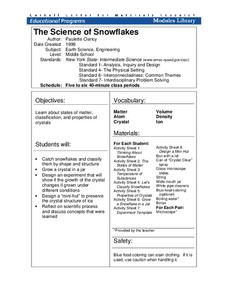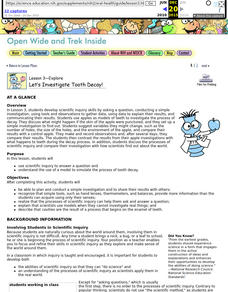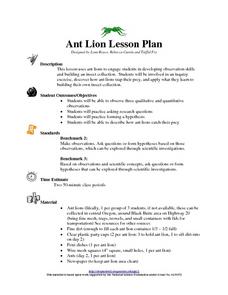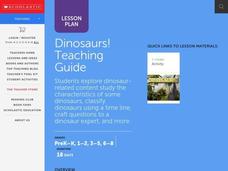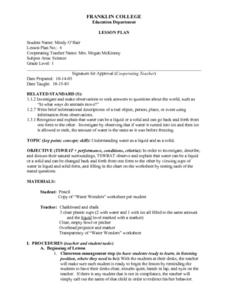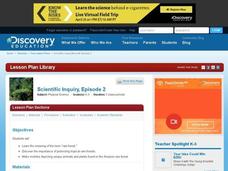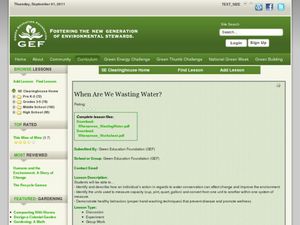Cornell University
The Science of Snowflakes
Who can grow the best crystals? Challenge class members to develop strategies for enhancing growth in the crystals. Through a lab investigation, learners study the properties of crystals and test the effectiveness of different growth...
Cornell University
Catapult
Studying levers couldn't be more exciting! Learners build their own catapults and test the results as they make adjustments to the fulcrum. They compete against other groups to create the most accurate apparatus.
Curated OER
Bungee Man Lab
Students explore the motion of a toy bungee jumper using the scientific method. They view a video of a bungee jumper and discuss what can be measured about a bungee jump. Students discuss the scientific mehtod and how to design an...
Curated OER
How Do You Know There is Air in a Bag?
Fourth graders explore air as a material substance. Through experimentation and discussion, they explore how air can be classified as a material substance. Students write three examples proving that air is a material substance in their...
Curated OER
Let's Investigate Tooth Decay
Students conduct a simple investigation to explore tooth decay.
Curated OER
Exploring Big Bang Evidence
Ninth graders study the Big Bang theory. In this big bang theory lesson students research the Internet and complete several activities and create a presentation.
Curated OER
Ant Lion Lesson Plan
Students observe three qualitative and quantitative observations. The students further practice the follwoing: asking research questions,forming a hypothesis, and describe how ant lions catch their prey. Students also form hypotheses...
Curated OER
Dinosaurs
Students will develop goals for inquiry. They will also improve content area reading and research skills. The context of studying dinosaurs will help learners to distinguish from organisms that live presently and those from the past...
Curated OER
Species Interactions
Students study the scientific concepts of biodiversity and conservation through the use of basic equations of population growth and hands-on experiments/simulations. The lesson includes a take-home assignment which can be used for final...
Curated OER
Water - Solid and Liquid
First graders conduct a science inquiry by comparing water in its liquid and solid form. The students describe the different stages of water and complete a worksheet answering questions about each form of the water. Teacher assessment...
Alabama Learning Exchange
Air is All Around You
Pupils investigate the mysteries of air. In this science lesson, students participate in hands-on activities that require them to use the scientific inquiry model to study air.
Curated OER
The Unique Rain Forest
Students explore the unique Rain Forest. In this Rain Forest lesson, students watch a video about the dangers the Rain Forest faces. Students create a Rain Forest mobile. Students choose plants or animals from the Rain Forest then write...
Curated OER
Case Study Two: Shark Dissection
Young scholars read an article on sharks prior to beginning a dissection lab. As part of the lab, students identify differences between the shark anatomy and human anatomy and hypothesize why those differences exist.
Tracy Pendry
Cardiovascular/Circulatory System
Explore the circulatory system with a cardiovascular pump activity that promotes discovery and discussion as class members create a functioning model of the heart. Continue the learning process through a web quest showcasing the body's...
Curated OER
Wildlife Conservation III
Discuss the importance of wildlife conservation. Learners talk about the animals and plants on the US Fish and Wildlife Services list of endangered and threatened species. Then, they engage in a detailed discussion of the reasons these...
Curated OER
Bacterial Transformation
Students discuss a bacterial experiment they previously performed and complete a pre-assessment. They participate in a lecture discussion given by the teacher through PowerPoint and then complete a cartoon worksheet and post-assessment.
Curated OER
Where is Away?
Focusing on where are garbage goes once we dispose of it, learners explore environmental concerns. Using a clear format, this lesson leads learners through a discussion of waste reduction, recycling, and composting. Then, they discuss...
Curated OER
Estimation Task
Upper graders practice their estimation skills by observing different objects then making their best guess without using measuring instruments. Young scholars are asked to estimate mass, length, volume, and area.
Curated OER
Why Are The Shore Birds Dying?
Learners engage in a field study of birds and how they are in danger harm due to environmental factors. They list different possible causes in a prediction activity. The observations are done while writing up data and connecting it to a...
Curated OER
When Are We Wasting Water
Students study water conservation. In this water conservation instructional activity, students participate in a water conservation experiment. Students discover how to conserve water while washing their hands.
Curated OER
How Can You Study Things You Can’t See Like: Atoms?
Learners simulate how scientists studied things they can't see like atoms. In this chemistry lesson, students predict what is inside the numbered obsertainers. They design a way to investigate what's inside without opening it.
Curated OER
Using Science Skills to Investigate Japanese Quail
Sixth graders explore Japanese Quail. They generate and record scientific questions about the quail. Students gather information from various sources and record their data. They compose an inquiry report and include it in a portfolio.
Curated OER
You Light Up My Life: Developing a Scientific Theory for What Fuels a Candle's Flame!
Young scholars examine how candles work and how scientific theories are developed and tested. Students propose hypotheses about what is burning in a candle then perform tests in order to develop their scientific theory. After a teacher...
Curated OER
Inquiry Lesson About Color
Students investigate the color choices artists make in their work, and to practice the scientific process of predicting, observing, inferring, and interpreting. This activity's purpose is to prepare students for a museum visit.


